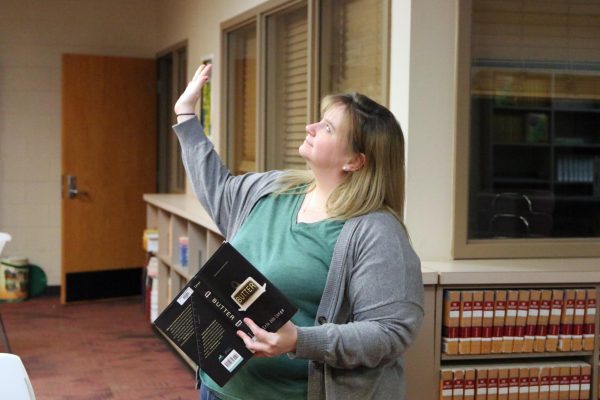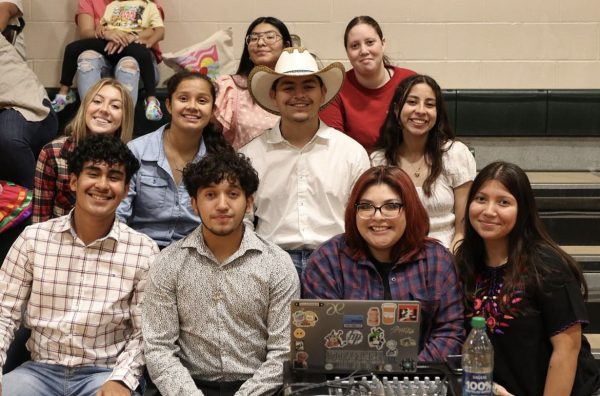Students experience anxiety when facing college decisions
Seniors at Harding Charter Prep express how they feel about college and what concerns them
November 28, 2022
College season is the one thing that never goes away, whether you are a senior in high school or a senior in college it is always a stressor. There is always something stressful about pursuing a higher education.
Between drafting a great essay and potential financial struggles, students can develop feelings of self-doubt and end up falling into a ‘college trap.’
Scholarships are not enough
“My main concern for college is money. Being in debt and not having enough to pay for college really scares me,” said HCP senior Jennyfer Perez. “I would love to go out of state if money wasn’t an issue for me.”
Perez mentioned that although it is useful information when colleges visit the senior class during the required senior capstone class, it makes her nervous when recruiters share the cost, especially for out-of-state students.
Money is just not something that any average teen and their family have. 70 percent of college students reported feeling stressed about their finances.
“College has a cost,” said Jonathan Richardson, an admissions counselor at the University of Central Oklahoma. “Yes, there are programs set in place to give students free education through scholarships, tuition waivers and offering of free gen-eds at 2-year schools but it’s not free for everyone.”
Students who don’t have the money end up having to take out student loans, where it can take up to twenty years to pay back those loans.
First Generation is Important
First generation students are those whose parents or grandparents did not attend or students who will be the first in their immediate families to graduate from a college or university.
Students who are first generation sometimes miss out on opportunities because they do not know how to navigate the system mentioned capstone teacher Emma Smreker.
“[First generation students] don’t know the process, if their parents never went to college, then they are new to this process, new to filling out FAFSA. Their parents might not understand it, they might not speak enough English to speak up for you, or help you with that process,” Smreker said.
Most first generation students are people of color, and their parents immigrated to the United States to give their children a better life and fighting chance. Some of these students are immigrants themselves and have a tough time finding scholarships without being an all-star athlete or being the top of their class.
“We see that in a lot of instances, our minority groups aren’t the majority of getting the scholarships, getting high ACT scores or things like that, it’s just statistically out there in the world,” Smreker said.
Many challenges come with being first generation, but it is important to find support and communicate with your college admissions counselor or even the guidance counselor at school.
“Being first generation makes me feel proud,” said senior Isaiah Reed. “Is is important because it sets a standard for my family and the families to come. By going to college and furthering my education and gaining the benefits, it will motivate my children to go college and help me accrue wealth that will continue to benefit them.”
Being first generation is something to be proud of, as students are on their way to accomplish something great. First generation helps students inspire future generations and it is opening doors for student’s families, according to senior Kathy Galindo.
“Although I am first gen, my two older brothers have already walked the path. I’m grateful that they can guide me and give advice,” Galindo said. My brothers have done stuff different and had a lot of errors in their college process. I am the last in my family to go to college but I’m still doing stuff that my parents are uncertain about. That’s why I want to pay for college as much as possible. They have sacrificed too much for me not to succeed and I plan to not stress them out once I am in college.”
Test Scores
College entrance exams are meant to be stressful, but students sometimes take getting high scores to the extreme. Students are disappointed with a 30 on their ACT, because they believe that getting that perfect score is the only way to get into college or to get enough scholarship money to cover the cost of tuition. However, with some colleges going test optional, students are given a fighting chance to get into the schools that they want.
“I can’t say that I am disappointed that colleges and universities are going test-optional, because it opens an opportunity for more students to be able to go to college and their ability to go to college is not just based on a score, but who they are as a person, on their resume or on their transcript,” Smreker said.
“I believe that ACT and SAT scores don’t define us, but to colleges they do. Because of COVID-19, many colleges are now test optional and for me that works in my favor because I have chosen a college that I know I will excel at and be able to pay for,” Galindo said. “My Oklahoma’s Promise, FAFSA and my GPA will pay for my four years at UCO. However, those who do not have Oklahoma’s Promise or must pay for college themselves, having that good test score is key to getting money and scholarships. It is a harsh reality.”
Students at HCP have even admitted that they do not care about their score and they are not going to let it define them.
“I don’t think that submitting an ACT or SAT score is that important to me,” Perez said. “If I wanted to include my score I’d take the ACT again, but I don’t need to since UCO is test optional.”
“I am not worried about my ACT or SAT scores since schools are still test optional,” Reed mentioned.
Contradicting that, a high score can help you in pursuing a higher education by getting scholarships or grants.
“We all have our own individual opinions about the ACT/SAT, but reality shows it is useful and receiving life changing scholarships and incentives. I think is important in the aspect that it can pay for your school,” Richardson said.
Suffering from Imposter Syndrome
Imposter syndrome is loosely defined as doubting your abilities and feeling like a fraud. It disproportionately affects high-achieving people, who find it difficult to accept their accomplishments. Many question whether they are deserving of accolades. (Ruchika Tulshyan and Jodi-Ann Burey)
However, it can affect students who are pursuing higher education. Students often feel like they aren’t good enough to go to college. They worry about the little things and go into a loop where they cannot figure out if they want to go to college or if it is even worth it to go.
“I’ve dealt with Imposter Syndrome after COVID-19 because we missed a year and a half. My biggest struggle became math and I want to major something math-related in college,” Galindo said. “I’ve always loved math, it was my favorite subject, but after the pandemic a whole year was lost and I felt lost too.”
“I feel like some students don’t go to college because they feel is it impossible for them to go or there is a lack of example to show them they are capable. Students need the right guidance going into college. College at the same time is not for everyone,” Richardson said.
Not having it all figured out is okay, Smreker said.
“You don’t have to know exactly what you want to do. That is what college is for, for helping you chose a path, choose what classes are for you and even ones that aren’t. You don’t have to have it all figured out your freshmen, sophomore or even your junior year,” Smreker said. “Try to step outside your comfort zone though, try to experience the world with this new light that you have. An “adult” you have more freedom and you have a chance to figure out who you really are outside the walls of your high school and your parents’ house. You can really explore who you are and figure out what it is what you want and for what you stand for.”
College isn’t for everyone
“To say that college is ‘necessary’ to be successful would be excusing anyone who didn’t go to college and still has great success in life,” Richardson said. “You can own a flourishing business, or have a trade or be in another industry where college is not needed. College can be a great path to success but the student most make the most out of their experience.”
Smreker agreed that college is not for everyone.
“I don’t think that students should feel pressured to go straight into college or pick a college after high school,” Smreker said. “It is a huge decision to make, to decided that you want to go straight from high school where you might not have done super great super well into a very rigorous environment.”
Smreker went on to say that students often do well exploring trades or getting an associate’s degree, which is a two-year degree.
“I know a lot of students that have done just as well going to technical school instead, or getting an association degree and making so much more money than I do,” she said.












